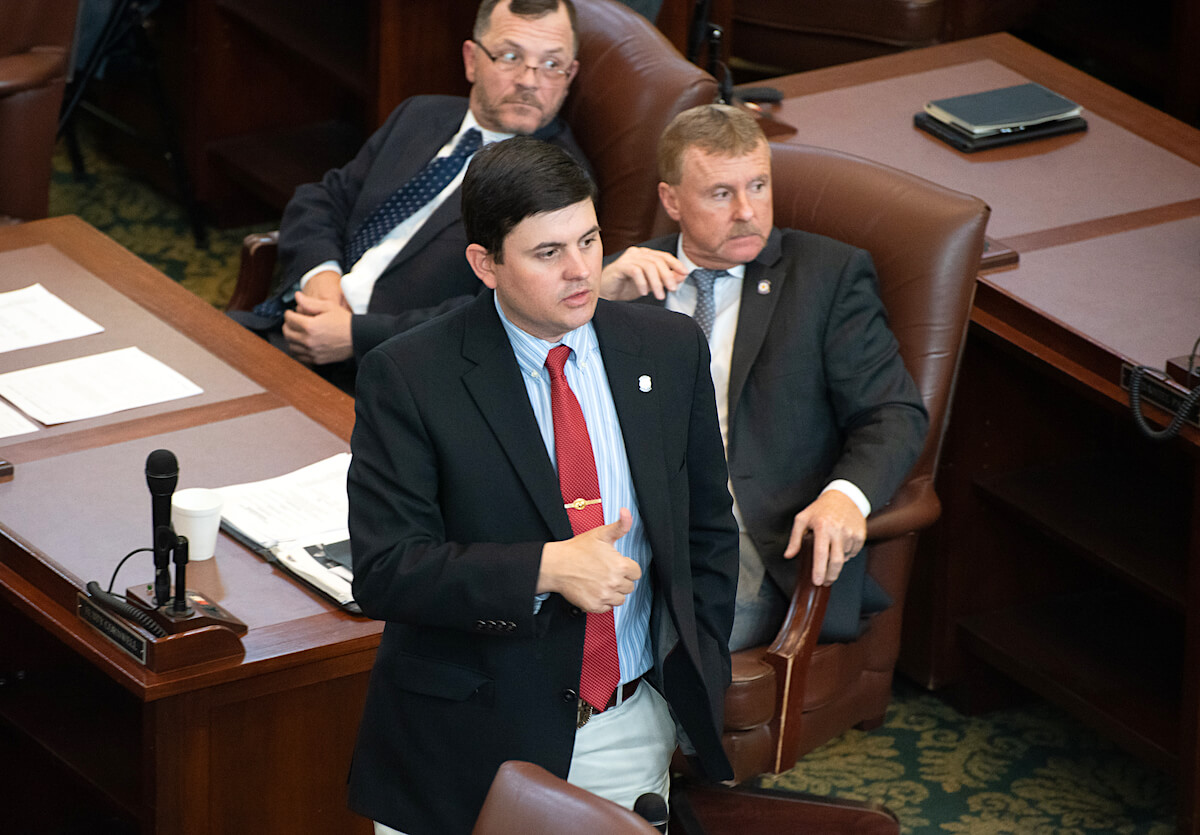After the Oklahoma Supreme Court unanimously affirmed a trial court’s ruling in October, federal production tax credits used to finance the construction of wind and solar farms can no longer be included in county assessors’ property valuations that determine the local taxes paid by energy companies.
The case specifically involved the operations of Kingfisher Wind, LLC, in Canadian and Kingfisher counties, and it sets up a scenario that will decrease some school district operating budgets and cause deficiencies in sinking funds, which pay off school bonds.
“This will have the net effect of lowering the valuation in the districts with newer wind energy systems,” said Oklahoma Public Schools Resource Center finance director Andy Evans.
Concerns over how energy industry assets can be valued differently in different counties have lingered for years. Wind and petroleum companies have routinely challenged tax assessments in court, a process that has locked payments into escrow accounts and has delayed distributions to school districts, career technology centers and various county services.
“We want to make it clear that we as a group don’t question the right of a taxpayer to dispute their taxes. That’s only fair,” said Evans, a longtime public education employee with expertise in school finance. “We have a situation where we have a new energy source [and] we are working through their tax status as we move forward.”
In 2021, about $80 million in property tax payments sat in escrow owing to valuation protests.
FROM 2021
‘Instability’: Hundreds of Oklahoma property tax protests leave schools in limbo by Megan Prather
In a statement, Cornerstone Government Affairs principal Mark Yates said the renewable energy industry is pleased that the Kingfisher Wind case was affirmed by the court.
“This decision should help better inform the third-party assessors as they work to arrive at fair-market value on energy assets around the state,” Yates said. “Counties, school districts and companies all desire consistency, fairness and more energy investment so that our communities can thrive for decades to come.”
However, Evans said OPSRC — which provides support and services to public schools — is estimating a $35 million loss in state aid, as well as a deficiency of at least $40 million in sinking funds owing to the decision.
Evans said finger pointing among energy companies, county assessors and other involved parties will not help the situation and that solutions need to be found to help affected school districts and counties move forward in a positive direction.
“There aren’t really any good guys or bad guys in this situation, but there has to be problem solvers that will help to solve the issue,” Evans said.
Rep. John Pfeiffer (R-Orlando) worked on a package of bills in the 2022 legislative session to address other parts of the property tax valuation quagmire. He said counties sitting within his district will see an impact from the Supreme Court’s recent decision.
“Hindsight is 20/20. As they started doing these assessments, I wish there was a little better communication that including the production tax credits was probably a riskier way to go,” Pfeiffer said. “I think it’s completely reasonable and not at all unforeseen that this wound up in litigation.”
‘This will affect every district in the state’
In their affirmation of the district court ruling, the Oklahoma Supreme Court said federal production tax credits (PTCs) are intangible property not subject to ad valorem taxation, according to the Oklahoma Constitution. PTCs are a tax incentive, which Kingfisher Wind and other companies historically baked into the financing equations for their facilities. The federal production tax credits relate to the kilowatt hours of energy generated by wind and solar farms. (Future hydrogen energy projects can also qualify for a federal production tax credit created in the Inflation Reduction Act passed by Congress this year.)
Kingfisher Wind began the construction of its wind farm within Kingfisher and Canadian counties in 2015, with Kingfisher and Canadian County assessors ultimately combining to value the property at about $458 million in 2016. Kingfisher Wind filed appeals in Canadian County District Court and Kingfisher County District Court, asserting that the fair cash value for the property was $169.3 million, or less.
The two appeals were eventually consolidated in Canadian County District Court, with the trial court issuing an opinion determining that PTCs are not property of any kind. The court valued the Kingfisher Wind farm at $175 million for taxation purposes. Kingfisher and Canadian County assessors filed an appeal with the Oklahoma Supreme Court, which ruled unanimously that PTCs are actually intangible personal property that is not to be included in ad valorem taxation.
Attorneys representing Kingfisher County and Canadian County have most recently filed a petition requesting the Oklahoma Supreme Court to reconsider its decision. On Nov. 7, they asked the court to hear oral arguments on the reconsideration motion.
“This will affect every district in the state,” Evans said. “The state aid in districts without wind energy systems will see the state aid factors lowered due to more WADM (weighted average daily membership) receiving state aid from the loss of chargeable revenue.”
Evans said districts such as Blackwell, Newkirk, Minco, Hennessey and Perry Public Schools will begin to receive “salary incentive aid” again and may possibly move back onto the “foundation aid” portion of the state aid formula for public school districts.
There are several other moving pieces following the ruling that Evans said need to be rectified for school districts, including:
- The placement of additional taxes on local taxpayers if a district has passed a bond issue based on the original increased valuation from a wind energy system;
- Effects to the county four-mill valuation on districts within the county, including the district(s) that lost valuation on a wind energy system; and
- The potential consequence of sinking funds not collecting all the revenues expected of them, resulting in the need for school auditors, bond issuers and school boards to work together to make sure districts’ sinking funds do not go into arrears on their payments.
‘PTCs are intangible personal property’
In their Oct. 18 ruling, the Oklahoma Supreme Court Justice Yvonne Kauger wrote that, “PTCs are intangible personal property exempt from ad valorem taxation — even if they have both tangible and intangible aspects.”
The ruling noted that while there is no doubt that tax credits are intertwined with real estate and may enhance the value of real property or have value for IRS taxation purposes, language in the Oklahoma Constitution states that intangible personal property is not taxable and that PTCs are intangible personal property. The ruling also stated that if the Oklahoma Legislature wanted to statutorily define PTCs as tangible property, it could do so but has not.
The court referenced its prior opinions in cases surrounding Globe Life and Accident Insurance Co. and Southwestern Bell Telephone Co.
The Kingfisher and Canadian County assessors filed their motion to appeal the district court ruling to the Oklahoma Supreme Court in September 2021. In April 2022, 15 wind farm limited liability companies filed a request to submit an amicus curiae brief, which was granted.
The assessors argued that PTCs are of such economic benefit in owning, operating and determining the full cash value of a wind farm that they must be included in ad valorem valuation for property tax purposes. But Kingfisher Wind and the other companies successfully argued that PTCs are intangible personal property, unable to be taxed under the State Constitution.
‘We made some pretty big reforms this last year’

Energy companies have long expressed frustration over valuation differences on property across county lines, as well as the use of third-party assessors hired by elected county assessors to value more complicated assets, such as wind farms, pipelines and petroleum production assets.
Particular issue has been taken with the use and valuation approach of Total Assessment Solutions, a third-party assessment company based in Arkansas and led by Jerry Wisdom, a man whose prior remarks about different ways to value property angered some legislators last year.
Multiple bills aimed at addressing property valuation disputes between county assessors and energy companies were introduced during the 2022 legislative session, with two of the measures, HB 2627 and HB 3901, being signed into law by Gov. Kevin Stitt in May.
For the 2023 regular session beginning in February, Pfeiffer said legislators will be aware of and focused on the school district funding impacts from the October court ruling. While lawmakers could re-classify PTCs as tangible property, Pfeiffer said he does not think the votes would be there to pass a functional tax hike. He said he would like to see the Legislature wait one year before considering more bills regarding property tax valuations.
“I think that’s a very slippery slope when we start spelling out in legislation what is or isn’t classified as tangible or intangible property,” Pfeiffer said. “We made some pretty big reforms this last year. I’d like to see how that shakes out before we start tinkering with it again.”
HB 2627, passed during the 2022 legislative session, requires energy companies protesting their tax valuations to file the correct paperwork in a timely manner and requires that county assessors inform school districts and tax jurisdictions of the property tax protests taking place within the county.
The bill also prohibits the use of a third-party assessor during informal valuation negotiations between county assessors and energy companies.
HB 3901, authored by Pfeiffer and Sen. John Michael Montgomery (R-Lawton), also became law this year. That bill aimed to settle ad valorem tax protests within the same calendar year by moving valuation appeals of $3 million or more from the district courts to the existing Court of Tax Review.
“I know the court is currently standing up the Court of Tax Review,” Pfeiffer said. “The one small bright side out of this is now that the Supreme Court has ruled on the Kingfisher Wind case, I think we’re about to see a whole bunch of these (property tax protests) settle out.”
Read the full Oklahoma Supreme Court ruling
https://nondoc.com/wp-content/uploads/2022/11/Kingfisher-Wind-2022-OK-83.pdf” viewer=”google”]























